
We are all familiar with the moving story of the World War 1 Christmas football game between German and English soldiers. This turned out to be largely apocryphal, but there were enough documented instances of informal fraternising between men across the trenches to alarm the generals. They knew that it’s hard to hate (let alone kill) people we see as ‘just like us’ – and that hatred and demonisation of the enemy are the fuels of war and essential to military success.
Fast forward 70-odd years and these powerfully destructive emotional forces were once again deployed in the territorial battle over the Falkland/Malvinas islands. One Argentine veteran reports that “I had to hate to be able to shoot” and that, long after the conflict had ended, he continued to hate the English with such a deep passion that he would throw his son out of the house if he uttered an English word. Yet, remarkably, this same Argentine now sits on an English stage alongside two of his own countrymen and three British veterans to present a collaborative piece of theatre about the war. The result is a theatrical experience which is both deeply personal and profoundly political. And very, very moving.
Minefield is dramatic compilation of memories and reflections from six men who fought in the Falklands/Malvinas conflict – a war that lasted a mere 74 days but had a profound and lifelong impact on those who participated. Painfully honest and raw, the show manages to be devastating critique of war without feeling at all polemical.
The six men simply tell their stories – how they became soldiers, their training, key events in the war, the aftermath, and even their experience of making this show. The stories are presented theatrically – complete with low-tech sound effects, overhead projector and Thatcher/Galtieri masks. But there is no artifice here. The power of the show is entirely in the authenticity of these men and their experiences. They are not actors, and they don’t need to be – their stories, plainly told, do all the work.
Permeating the show is an extraordinary spirit of mutual respect, acceptance and reconciliation. Each man speaks in his own language, with the English/Spanish translation displayed across a large screen. Each event is recounted from the viewpoint of the participant, with no attempt to sanitise or defend. Argentinian veteran, Ruben, describes how he survived the sinking of the Belgrano, in which 323 men died. And as we reel emotionally from the horror of his experience, British veteran, Lou, states simply: “We were relieved that it was sunk.”
We are told that, during the rehearsal process, the men avoided any debate about the rights and wrongs of the UK/Argentine respective claims. Yet, again remarkably, they do not let their inevitably opposing viewpoints be the elephant in the room during the show itself. At one point, they even shout accusations at each other: “The Belgrano was outside the exclusion zone! …You put a white flag up and then shot at our soldiers when they came close!” They also (very amusingly) highlight the two countries’ disputed accounts of the islands’ history. To keep hold of these deep-rooted feelings and differences and yet work together to produce such an honest and intimate piece of theatre demonstrates an extraordinary level of commitment to what writer/director Lola Arias calls this ‘social project’. And, as becomes clear in the post-show Q & A with the cast, transcending their partisan perspectives has not been without its emotional challenges.
Minefield is a full of telling ironies. Ruben plays in a Beatles tribute band (the Get Back Trio) whilst wearing a T-shirt declaring “The Malvinas are Argentine.” Lou struggles with shame for grieving over an Argentine soldier who, in his dying moments, spoke to him in English of a visit to Oxford. (“I wish he hadn’t spoken in English”). Gabriel was a reluctant soldier who, since the war, has spoken about little else.
Pride, shame, fear, anger – they are all present in these stories. What is absent is any triumphalism, bitterness or stereotyping. These are complex men with complex responses to a complex situation. They have been courageous enough to share their experiences – with each other and with us. British veteran David Jackson – who now works as a psychologist with soldiers from a range of conflicts – emphasises the importance of giving voice to these stories and being heard. Well, we listened. And it was a humbling experience.


Minefield is at HOME until Saturday April 14th. It is part of HOME’s Viva! Spanish and Latin American Festival.
https://homemcr.org/production/minefield/
https://homemcr.org/event/viva-spanish-latin-american-festival-2018/
I can imagine that would be a powerful, & moving experience!
LikeLike